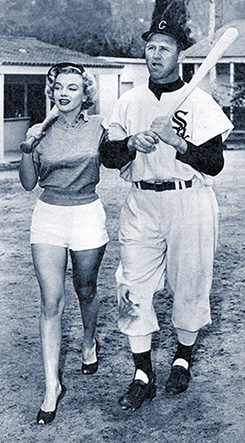The TGG Interview
Gus Zernial
“Yeah, Philadelphia—they’ll boo ya’. They’re certainly some boo birds there. Announcer told fans I’d broken my shoulder. Took me down this tunnel and I could hear them booing me all the way down to the clubhouse.”

Gus Zernial takes a stroll with Marilyn Monroe during a 1949 magazine photo shoot. According to Zernial, the starlet asked “a bunch of questions about baseball.”
Gus Zernial’s greatest achievement in major league baseball was probably when he led the American League in home runs in 1951. He was a power-hitting outfielder who never played for a first division team, but hit 237 career homers and batted .265. His nickname was Ozark Ike, based on a popular comic strip at the time. From 1951-1957, only Mickey Mantle hit more round trippers in the AL. In 1951, Zernial hit 33 homers, and in 1953, he had his best power year with 42. He played for the A’s in Philadelphia and Kansas City; then with the Chicago White Sox and Detroit Tigers. Although he was a great hitter, his fielding was far from spectacular. Twice during his career he broke his collarbone chasing down fly balls.
As told to Ed Attanasio, This Great Game
Norma Jean and Ozark Ike:
While with the White Sox in 1949, a young starlet by the name of Marilyn Monroe came to the ballpark to do a pictorial for a National Enquirer-type magazine. Gus remembered that she was “such a nice girl.” “She asked a bunch of questions about baseball…she was really interested in the game.” Zernial said that he was perplexed later when they made her look less than wholesome in many of her films. When Joe DiMaggio started dating Monroe years later, they asked him about Marilyn and Gus, and the Yankee Clipper made a disparaging remark about Zernial, something to the effect that “Marilyn would never date a bush leaguer like Zernial.” For some reason known only to Joe, DiMaggio held a grudge against Zernial until the day he died.
On Not Making the 1951 All-Star Team Despite 33 Home Runs and 129 RBIs:
“There was a guy around at that time named Ted Williams, and although I always finished second, he pretty much beat me out in the All-Star voting every time. Casey Stengel was the manager of the All-Stars every year, because the Yankees won the American League every year, but he never chose me. Casey never selected me for the All-Star team, and I was always up in the voting. But, he had people he wanted to put in there, and I can understand that. Casey had his own players that he liked to select. For instance, Jackie Jensen was someone he liked to pick, even though he didn’t do real well in the voting that year. And in 1953, when Ted had to go back in the service for awhile, of course, I won the voting that year. I started the All-Star game, and Casey was still there. I think he would have prevented me from playing in the game that year if he could have. He was so anxious to get Minnie Minoso in there that he barely let me get two at bats. But, I singled in that game—it was the first base hit of the game. But, that’s Casey. Managers will always have their favorites and they still do.”
On striking out a lot:
“Today they strike out 110 times only halfway through the season. I averaged about 70 strikeouts a year. In 1951, we didn’t have a good team. We had good players, but we didn’t have a good ballclub. And I think in some of those games I was just trying to hit a home run late in the game when we were trailing. That’s no excuse for the strikeouts, but we’d be behind and I’d go up and try to hit it out, you know?”
On his association with Luke Appling:
“Luke Appling took me by the hand, showed me around the league, took me to into a few bars, showed me the ropes, so to speak. No, he was a great, great guy. Luke and I become good friends, he did it all with me. I’m really happy to say I played with some really great players. Played with Appling, Al Kaline—guys like that. I had some Hall of Fame years, but I certainly didn’t have a Hall of Fame career. In 1954 when I got hurt, that was the end for me. Hurt my shoulder.”
On Being Booed by Philadelphia Fans When he Hurt His Shoulder:
“Yeah, Philadelphia—they’ll boo ya’. They’re certainly some boo birds there. The announcer told fans I’d broken my shoulder. Took me down this tunnel and I could hear them booing me all the way down to the clubhouse.”
On racism in the game:
“I think when Jackie Robinson first came up, I think some of the players resented it, and some didn’t. But, I never had any trouble with it, at all. Told my brothers, “Hey, the black players are just the same as us.” They resented that situation. I said, “Hey, that’s part of the game.”
On old ballparks:
“Every home ball park I played in is now gone. There’s nothing left. Chicago. Chicago’s stadium is gone. Same with Philadelphia, Detroit and Kansas City. All those stadiums are gone. Tiger Stadium is actually still there, but they don’t play there anymore. Detroit used to have a nice downtown, but it’s not as nice now.”





